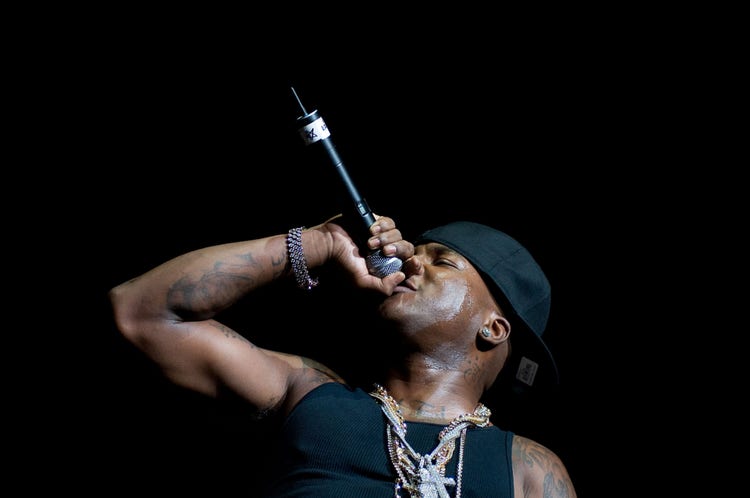
Back in 2005, a 25-year-old Jeezy sat with Vibe in 2005 for a cover story that would compliment the arrival of his hotly anticipated debut album, Let’s Get It: Thug Motivation 101. For his first in-book profile, the Atlanta native was coy, brief, and to the point when asked about his shadowy past. Questions about the Black Mafia Family (B.M.F) and a bloody rivalry with one-time “So Icy” collaborator Gucci Mane were all deflected. One thing from his past that he did expound on, though, was an epiphany that rocked his world. “I was riding around one day like, Damn you ain’t done shit with yourself,” he recalled. “You’re just like everybody else. You’ll be out here until you’re gone. Either somebody kills you or you go to jail. I didn’t want to be a statistic.” In that moment, his sudden realization became inspiration — or better yet, motivation.
In the decade and a change that has passed since his epiphany, Jeezy’s reflection is now realization. The album, which Kendrick Lamar famously referenced on his own seminal debut album good kid, m.A.A.d city, is a testimony to a dream realized and destination set on life’s GPS.
On July 26, 2005, Jeezy’s major-label debut, Let’s Get It: Thug Motivation 101, turned a self-professed trapper to rapper, and nothing was the same. To say that Jeezy gave prophecy on the opus, would be to state the obvious. But, the kind of prophecy we’re talking about here is one that doesn’t come from just any album.
Like many critically-acclaimed releases, as far as rap albums go, the 2005 opus wasn’t just an album of hit songs and star-studded guest features (although, it did feature JAY-Z and T.I. to name a few). Besides the barcode, the marketing and label backing, Thug Motivation was and is life story told through wax. “My biography, you damn right, the true story,” he admits on “Soul Survivor.” To open, Jeezy raps “I used to hit the kitchen lights, cockroaches everywhere” (“Thug Motivation 101”), and to close, we hear “If you from where I’m from you gotta get it how you live.” In between all of that, Mr. 17.5 dances with “million dollar dreams” and “federal nightmares” across a palette of rollicking 808s and booming production.
To the average listener, his rhymes may have appeared as nothing more than couplets of braggadocio and bird-play — and to that end, songs like “Get Ya Mind Right” and “That’s How Ya Feel” fit the notion. But for a generation of young black men dealing with the bleak ghetto realities on a day to day, beneath the surface of those records were sermons of hope, truth, and enlightenment. It also painted a picture to a lifestyle that forced some to work their wrist as means of making the world work for them.
“Look up in the sky and tell me what you see, the clouds,” he asks on “Let’s Get It,” before answering, “Nah… I see opportunity, I’m an opportunist.” While his rhymes may not have moved mountains, they were concise enough for many of us to see that bigger picture. As if there was a target on his back, Jeezy navigated through his debut LP like an instructor on a mission — the latter being his goal of prepping listeners for the next phase that life has to offer. As the saying goes, experience is the best teacher. And though he has “seen it all,” including “death around the corner,” Jeezy takes full advantage of each record to describe the stripes that earned him the position of being at that proverbial podium.
On “Soul Survivor,” still his biggest single to date, he doesn’t just deliver a trap anthem, he shares a perspective of the hustler and the ambition that calls them to the streets. America is built on the ideal of survival of the fittest, by any means. To that point, he asserts on the song, “I ain’t cheat, played the hand I was dealt”— meaning, as someone who is striving to survive and put food on the table, this was the most accessible path for me take. “This ain’t a rap song, nigga, this is my life.”
In all of these moments, Jeezy offers bits and pieces of his world and the journey that got him to a point of that aforementioned realization. The blood (“I got a Sixth Sense, I see dead people”). The pain (“How the fuck I’m free out here and you locked in there”). The triumph (“Last time I checked I was the man on these streets”). Every bump in the path he chose has made Jeezy into who he is today, and that journey couldn’t have been possible without a realization that became motivation.